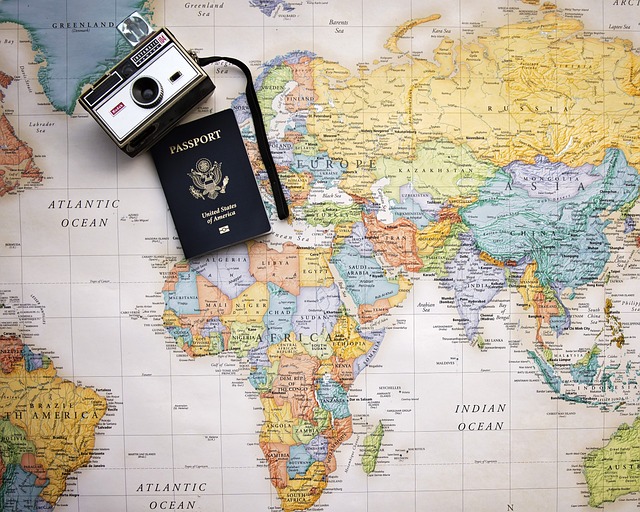A Beginner's Guide to Traveling Abroad
AN EDUCATIONAL RESOURCE GUIDE TO TRAVELING ABROAD FOR YOUR FIRST TIME
 Traveling to another country is an exciting opportunity to experience new cultures, see amazing sights, and create unforgettable memories. However, preparing for international travel requires planning and attention to detail. From ensuring that your documents are in order to researching the local customs of your destination, taking the right steps beforehand can help make your journey enjoyable and stress-free.
Traveling to another country is an exciting opportunity to experience new cultures, see amazing sights, and create unforgettable memories. However, preparing for international travel requires planning and attention to detail. From ensuring that your documents are in order to researching the local customs of your destination, taking the right steps beforehand can help make your journey enjoyable and stress-free.
1. Apply for or Renew Your Passport
A passport is your essential travel document for international trips. If you don’t already have one, apply for it several months in advance, as processing times can be lengthy. If you already have a passport, make sure that it will remain valid for at least six months after your planned return date, as many countries won’t let you in with a passport that’s set to expire soon.
2. Research Visa Requirements
Depending on the country you’re visiting, you may need a visa in addition to your passport. A visa grants you permission to enter a specific country for a set purpose, such as tourism or business. Application processes and time frames vary widely, so check the requirements for your destination well in advance. Some visas can be obtained online, while others might require a visit to an embassy.
3. Prepare for Health Requirements
Certain countries have specific health requirements for travelers, such as vaccinations against local diseases. Make sure you’re aware of these requirements and get any necessary vaccines well before your trip. Additionally, check whether you’ll need proof of COVID-19 vaccination or other health documents upon entry.
4. Stay Informed About Travel Advisories
Check for any travel advisories or restrictions for your destination. Travel advisories provide important updates on safety concerns like natural disasters, political unrest, or health risks. Staying informed helps you plan safely and ensures that you’re prepared for any challenges you might face.
The U.S. State Department categorizes travel advisories into four levels to help travelers assess safety risks in different countries:
- Exercise Normal Precautions: Travel is safe for most people.
- Exercise Increased Precautions: Certain risks may require extra awareness.
- Reconsider Travel: There are significant safety concerns.
- Do Not Travel: Dangerous conditions make travel inadvisable.
Each country’s advisory level is listed on the State Department’s website with information about specific risks, such as crime, terrorism, or political instability.
5. Organize Your Finances
Before you leave, research the local currency of your destination and plan how you’ll access money during your trip. In many countries, credit cards are widely accepted, but in some, you may need cash for daily transactions. Consider exchanging some currency before you leave or using ATMs at your destination. Be mindful of exchange rates and any fees your bank might charge for international transactions.
6. Learn About Your Destination
Understanding the culture, customs, and laws of your destination is key to having a positive experience. Research etiquette for dining, dressing, and greeting others so you can show respect to the locals. Familiarize yourself with any unique laws or regulations, as what’s acceptable in one country might be frowned upon or even illegal in another. And if you plan on driving while you’re there, find out whether you’ll need an international driving permit and get one if necessary.
7. Share Your Travel Plans
Before your trip, give a trusted friend or family member your itinerary, including your flight and accommodation details, so that someone back home knows where you’ll be and can help in case of emergencies. Checking in with them periodically during your trip can provide extra peace of mind for both you and your loved ones.
8. Invest in Travel Insurance
Travel insurance can cover the costs associated with unexpected events like flight cancellations, lost luggage, or medical emergencies. Different plans offer varying levels of coverage, so choose one that suits your needs and the specifics of your trip.
Other Tips for an Enjoyable Trip
- Ease Into the Time Zone: Reduce jet lag by staying hydrated and taking it easy on your first day. Give your body time to adjust to the new time zone before jumping into a packed schedule.
- Pack Smart: Travel light to make navigating airports and transportation easier. Packing less also leaves more space for souvenirs and gifts you may want to bring home.
- Protect Your Documents: Keep a photocopy of your passport and visa stored securely, such as in a hotel safe or a hidden compartment in your luggage, in case the originals are lost or stolen.
- Bridge the Language Gap: Learn a few basic words and phrases in the local language to help you navigate and connect with locals. Apps like Google Translate can also be a lifesaver when you need quick translations.
- Stay Connected: Purchase a local SIM card or eSIM upon arrival so that your phone works immediately for navigation, communication, and accessing travel resources.
- Exchange Money Safely: Use authorized money changers, banks, or ATMs to get the best exchange rates and avoid the risk of counterfeit currency.
Additional Travel Tips and Resources
- 30 Things to Do Before Traveling Abroad
- The Best Travel Tips for World Travelers
- The Complete Beginner’s Guide to International Travel
- 12 Top Safety Tips for International Travel
- Nine Ways to Travel More Safely
- Your Survival Guide to Safe and Healthy Travel
- U.S. Travelers’ Top Ten Travel Tips
- What to Know Before Flying Internationally
- The Ultimate International Trip Packing List
- 15 Simple Travel Safety Tips Everyone Should Know
- Essential Travel Safety Tips
- Tips for First-Time International Travel
- Getting Croatian Citizenship by Descent
- Useful International Travel Advice for First-Timers
- 30 Basic Safe Travel Tips for Traveling Abroad
- Money Tips for Traveling Abroad That Will Save Your Budget
- International Travel Tips to Know Before Going Overseas
- How to Become a Croatian Citizen
- Tips to Prepare for an International Trip
This page was last updated with help by Marco Permunian


